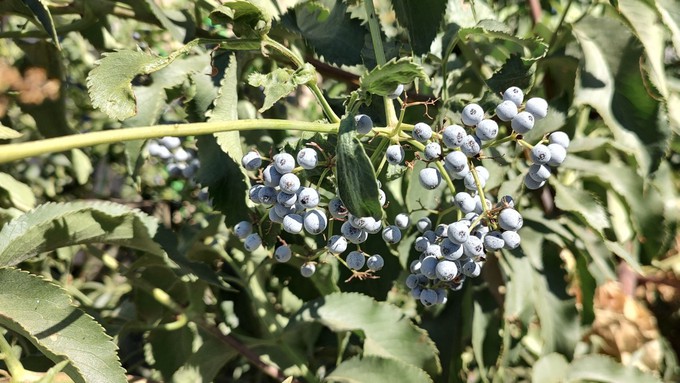
In addition, American River Ranch holds its own plant sale, fall gardening clinic

Elderberries ripen on a plant outside the nursery of the Sacramento Valley chapter of the California Native Plant Society. The native plant is an important source of food for birds. Debbie Arrington
When it comes to native plants, fall is for planting. So what better way to start the new season than by making some native additions to your garden?
Just in time for fall transplanting, the Sacramento Valley chapter of the California Native Plant Society will hold an in-person plant sale Saturday, Sept. 16, at its SacValley Nursery, at Soil Born Farms' American River Ranch in Rancho Cordova.
Sale hours are 10 a.m to 2 p.m. Expect a wide assortment of California native shrubs, perennials and trees that love growing in the greater Sacramento area.
Located close to the American River, the nursery offers a wide range of proven natives for Sacramento Valley gardens. Its September inventory includes such pollinator magnets as yarrows, milkweeds, manzanitas, Dutchman’s pipe and sages. Expect to find some California lilacs, buckeyes and oaks, too.
While attending the sale, check out the nursery’s demonstration gardens and see how these beautiful natives thrive.
Can’t make Saturday’s sale? The SacValley Nursery will offer an online sale Sept. 23-25 with pickup from the nursery on Sunday, Oct. 1.
Also on Saturday, Sept. 16, Soil Born hosts its own fall plant sale from 8 a.m. to 2 p.m. Its sale features fruit trees, vegetable starts, herbs, succulents and perennial vegetables. “All plants are organically grown with love and selected for the Sacramento area,” says Soil Born.
Need expert advice? Starting at 8 a.m., Soil Born will host a free garden clinic with eight classes and three walking tours. Among the highlights: “Gardening as a Family” (at noon in the Youth Garden) invites the whole family to get their hands dirty and play with plants.
For the full schedule and details: https://soilborn.org/.
Soil Born Farms' American River Ranch is located at 2140 Chase Drive, Rancho Cordova. Admission and parking are free.
Comments
0 comments have been posted.Sacramento Digs Gardening to your inbox.
Food in My Back Yard Series
May 6: Maintain soil moisture with mulch for garden success
April 29: What's (already) wrong with my tomato plants?
April 22: Should you stock up on fertilizer? (Yes!)
April 15: Grow culinary herbs in containers
April 8: When to plant summer vegetables
April 1: Don't be fooled by these garden myths
March 25: Fertilizer tips: How to 'feed' your vegetables for healthy growth
March 18: Time to give vegetable seedlings some more space
March 11: Ways to win the fight against weeds
March 4: Potatoes from the garden
Feb. 25: Plant a fruit tree now -- for later
Feb. 18: How to squeeze more food into less space
Feb. 11: When to plant? Consider staggering your transplants
Feb. 4: Starting in seed starting
Sites We Like
Garden Checklist for week of May 11
Make the most of the lower temperatures early in the week. We’ll be back in the 80s by Thursday.
* Plant, plant, plant! It’s prime planting season in the Sacramento area. Time to set out those tomato transplants along with peppers and eggplants. Pinch off any flowers on new transplants to make them concentrate on establishing roots instead of setting premature fruit.
* Direct-seed melons, cucumbers, summer squash, corn, radishes, pumpkins and annual herbs such as basil.
* Harvest cabbage, lettuce, peas and green onions.
* In the flower garden, direct-seed sunflowers, cosmos, salvia, zinnias, marigolds, celosia and asters. (You also can transplant seedlings for many of the same flowers.)
* Plant dahlia tubers.
* Transplant petunias, marigolds and perennial flowers such as astilbe, columbine, coneflowers, coreopsis, dahlias, rudbeckia and verbena.
* Keep an eye out for slugs, snails, earwigs and aphids that want to dine on tender new growth.
* Feed summer bloomers with a balanced fertilizer.
* For continued bloom, cut off spent flowers on roses as well as other flowering plants.
* Add mulch to the garden to maintain moisture. Mulch also cuts down on weeds. But don’t let it mound around the stems or trunks of trees or shrubs. Leave about a 6-inch-to-1-foot circle to avoid crown rot or other problems.
* Remember to weed! Pull those nasties before they set seed.
* Water early in the day and keep seedlings evenly moist.